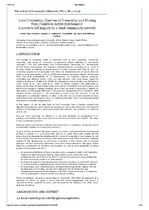Local ownership, exercise of ownership and moving from passive to active entitlement: a practice-led inquiry on a rural community network
Date
2015Author
Rey-Moreno, Carlos
Sabiescu, Amalia
Siya, Masbulele Jay
Tucker, William David
Metadata
Show full item recordAbstract
In this paper, we aim to shed light on local ownership from a double practical and
theoretical perspective, and examine its meaning as well as the factors that are bound to
influence its development in community based interventions. The questions we intend to
answer are: How can 'local ownership' be defined in a way that facilitates its investigation in CI practice, and enables at the same time its theoretical examination and relation with other CI key conceptual constructs? What key factors contribute to fostering local ownership in CI initiatives, taking the case of an externally initiated rural community network? To answer these questions, the paper reports on a study which assessed the development of local ownership in a rural community network in South Africa and singled out the factors found to delineate the development of a sense of ownership in local people, as well as driving the exercise of ownership towards autonomous local action. Based on a detailed analysis of the development of community ownership in this project, and in constant dialogue with the community informatics and social science literature, the paper makes three key contributions to CI theory and practice, as well as more specifically to future practice in community networks:
An operational definition of local ownership and a conceptual model which highlights
relations to other constructs such as responsibility, power and control and
emphasises the role of local ownership in moving from passive to active entitlement
towards community assets or CI interventions An empirical analysis of the development of local ownership in a community network in rural South Africa, highlighting the critical factors that led to fostering ownership An examination and critical discussion of factors that are positively related with the development of ownership, carried out in dialogue with CI scholarship and highlighting the bearing of and relations with other critical constructs in CI research, such as participation, empowerment, and capacity building
These contributions come at a critical stage in community informatics development as a
discipline, in which, we argue, a more solid and critical engagement with theory is
required to firmly establish its place and the premises for dialogue with other sociotechnical disciplines.

